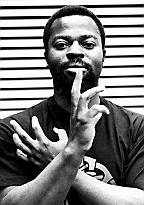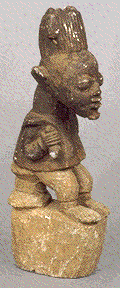Ben Okri, The Famished Road Bks 1-3: Themes, Characterization, and Style
Magical Realism, the Carnivalesque, and the Abiku (a + bi + ku = "one born to die")
See "Introduction to Magical Realism" & "What is the Carnivalesque?"
Discussion Questions
- How does Azaro’s experience ask the reader to undergo a near merging of European realism and African supernaturalism?
- Is the magical realism of the book, following Wendy Faris’ terms, more epistemological or ontological?
- Which primary and secondary characteristics of magical realism apply to The Famished Road?
- Does Azaro’s narration seek to defamiliarize the scenes for the reader?
- Does The Famished Road seek to reverse accepted categories (class, age, gender, spiritual)?
- Are any aspects of the carnivalesque present in Azaro’s experience (ritual spectacle, comic compositions, abusive language, bodily distortion, or the grotesque)?

Yoruba Cosmology, Suffering, and a Biblical Critique
See "Yoruba Cosmology" [Handout] & "Notes Toward A Biblical Model of Supernatural and Demons"Discussion Questions
- How do the characters seek to balance, manage, or placate supernatural forces in the book? (Note some of the following pages: 12-14, 15-18, 25ff., 88, 103, 107ff., 133ff., 244ff.)
- What is your impression of the overall spiritual atmosphere of the work?
- What is the literary purpose of the abiku visions of the spirit world? What do they reveal about Azaro, his world, his family?
- How would a biblical cosmology respond to and understand Azaro’s experience?
(For a thorough example of this see http://www.cabtal.org/ATRpaper.pdf)
Politics, Poverty, and The Road
- Look at the following passages and decide what Okri is suggesting about Nigerian politics: 122-127, 128, 152-153, 168-169, 175ff., 192, 198ff., 233ff.
- How is the world of politics and economics related to the spirit world?
- How does Okri portray the conditions of the family’s poverty? (32-33, 70-71, 78-81, 83ff.)
- What role does violence, oppression, and suffering play in their world? (cf. 10-11, 146ff., 154-156, 263-265)
- What is the significance of the title? Why is the road such an important metaphor for the novel? (cf. 46, 94, 113-115, 121, 183, 258-261)
Characterization
Work up a character analysis of the following:
- Dad (28-29, 34, 44, 50, 53, 58-60, 70-71, 85, 117-119, 148-152, 237)
- Mum (53-55, 129, 162, 168-170, 227-228, 257)
- Madame Koto (37, 75, 100-101, 221-226, 239, 249ff.)
- The photographer (45, 91, 141ff., 156-158, 173ff., 188ff, 231ff.)
Style
Consider what the following reveal about Okri's style and approach:
- Prose description (cf. 3-6, 18, 32, 138)
- Dialogue (cf. 16-17, 62-63, 66, 163-164,167, 231)
- Key lines (40, 140, 158, 219, 228-229)

